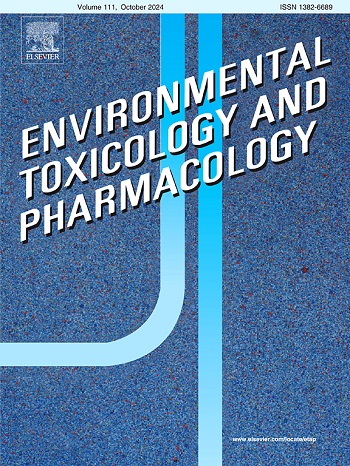Analysis of cytotoxicity and genotoxicity of diesel exhaust PM2.5 generated from diesel and dual natural gas-diesel engines
IF 4.2
3区 环境科学与生态学
Q2 ENVIRONMENTAL SCIENCES
引用次数: 0
Abstract
Diesel exhaust particles (DEPs) are atmospheric pollutants associated with adverse health effects. In response to their impact, natural gas (NG) has emerged as a promising alternative fuel due to its cleaner combustion. Although the cytotoxicity and genotoxicity of DEPs from diesel or NG engines have been extensively studied, the impact of dual natural gas-diesel systems remains unexplored. This study evaluated the toxicity of DEPs (PM2.5) emitted by an engine in diesel mode and dual natural gas-diesel mode on cellular parameters such as viability, apoptosis, oxidative stress, and DNA damage. The results showed that diesel DEPs reduced cell viability by up to 31 %, compared to a 19.2 % reduction with dual-mode DEPs. Apoptosis induction was also higher with diesel DEPs, with a 7 % increase compared to the dual mode. While dual-mode DEPs increased the production of reactive oxygen species (ROS) without causing DNA damage, diesel DEPs generated high ROS levels and measurable DNA damage. These differences could be attributed to the physicochemical characteristics of each mode, as diesel DEPs contained higher concentrations of polycyclic aromatic hydrocarbons (PAHs). This study addresses a research gap by quantifying the health effects of emissions from dual-fuel engines and highlights the potential of these systems to reduce DEP-induced toxicity.

柴油及双天然气-柴油发动机柴油机尾气PM2.5的细胞毒性和遗传毒性分析。
柴油废气颗粒(DEPs)是一种对健康有不良影响的大气污染物。为了应对它们的影响,天然气(NG)因其更清洁的燃烧而成为一种有前途的替代燃料。尽管来自柴油或天然气发动机的DEPs的细胞毒性和遗传毒性已经被广泛研究,但双天然气-柴油系统的影响仍未被探索。本研究评估了柴油模式和双天然气-柴油模式下发动机排放的DEPs (PM2.5)对细胞参数(如活力、细胞凋亡、氧化应激和DNA损伤)的毒性。结果表明,柴油DEPs降低了高达31% %的细胞活力,而双模DEPs降低了19.2% %。与双模相比,柴油DEPs诱导的细胞凋亡率提高了7 %。虽然双模DEPs增加了活性氧(ROS)的产生而不会造成DNA损伤,但柴油DEPs产生了高ROS水平和可测量的DNA损伤。这些差异可能归因于每种模式的物理化学特性,因为柴油dep含有更高浓度的多环芳烃(PAHs)。本研究通过量化双燃料发动机排放对健康的影响,解决了研究空白,并强调了这些系统在减少深埋物引起的毒性方面的潜力。
本文章由计算机程序翻译,如有差异,请以英文原文为准。
求助全文
约1分钟内获得全文
求助全文
来源期刊
CiteScore
7.00
自引率
4.70%
发文量
185
审稿时长
34 days
期刊介绍:
Environmental Toxicology and Pharmacology publishes the results of studies concerning toxic and pharmacological effects of (human and veterinary) drugs and of environmental contaminants in animals and man.
Areas of special interest are: molecular mechanisms of toxicity, biotransformation and toxicokinetics (including toxicokinetic modelling), molecular, biochemical and physiological mechanisms explaining differences in sensitivity between species and individuals, the characterisation of pathophysiological models and mechanisms involved in the development of effects and the identification of biological markers that can be used to study exposure and effects in man and animals.
In addition to full length papers, short communications, full-length reviews and mini-reviews, Environmental Toxicology and Pharmacology will publish in depth assessments of special problem areas. The latter publications may exceed the length of a full length paper three to fourfold. A basic requirement is that the assessments are made under the auspices of international groups of leading experts in the fields concerned. The information examined may either consist of data that were already published, or of new data that were obtained within the framework of collaborative research programmes. Provision is also made for the acceptance of minireviews on (classes of) compounds, toxicities or mechanisms, debating recent advances in rapidly developing fields that fall within the scope of the journal.

 求助内容:
求助内容: 应助结果提醒方式:
应助结果提醒方式:


